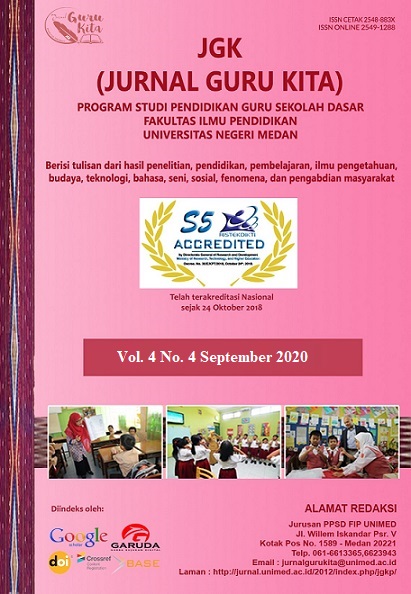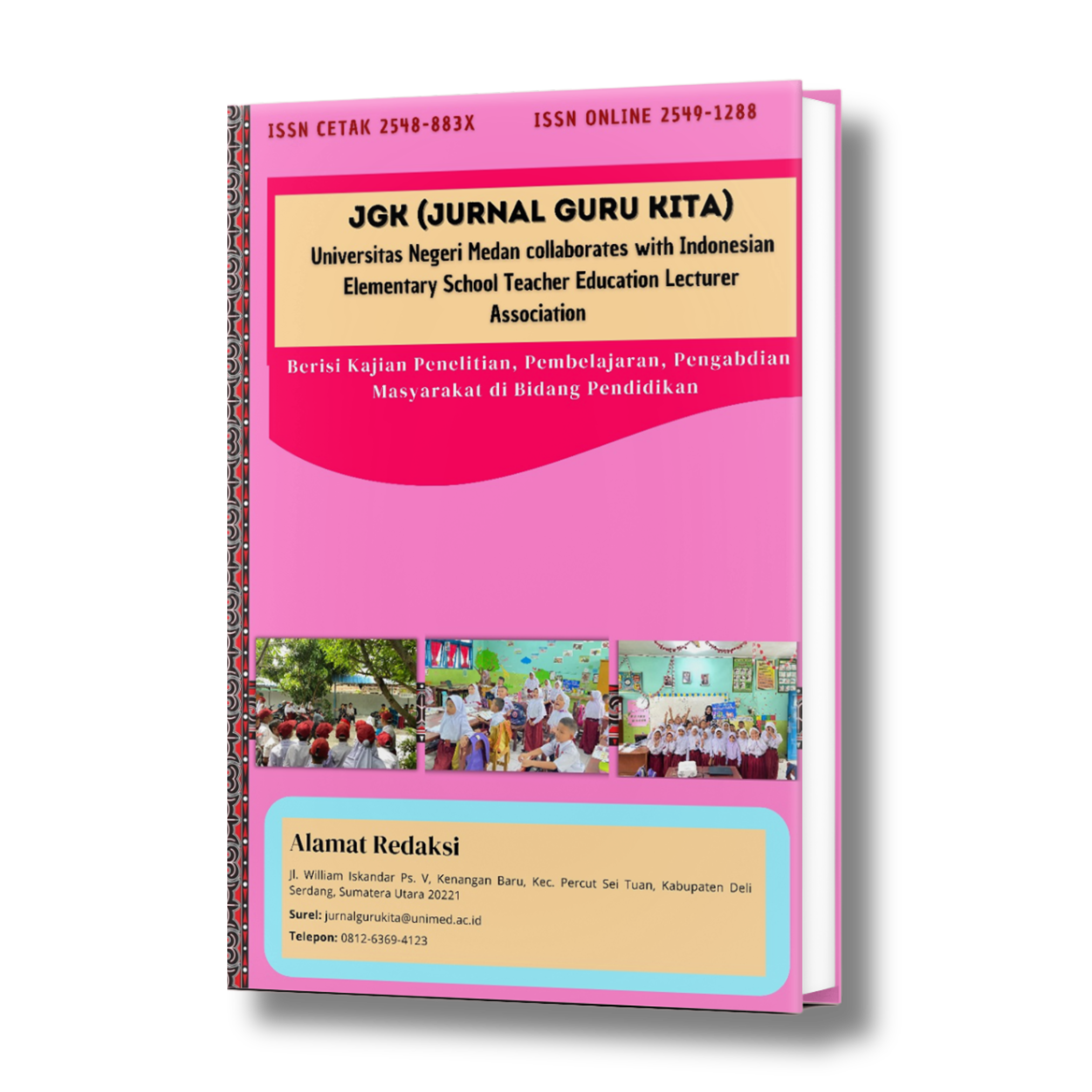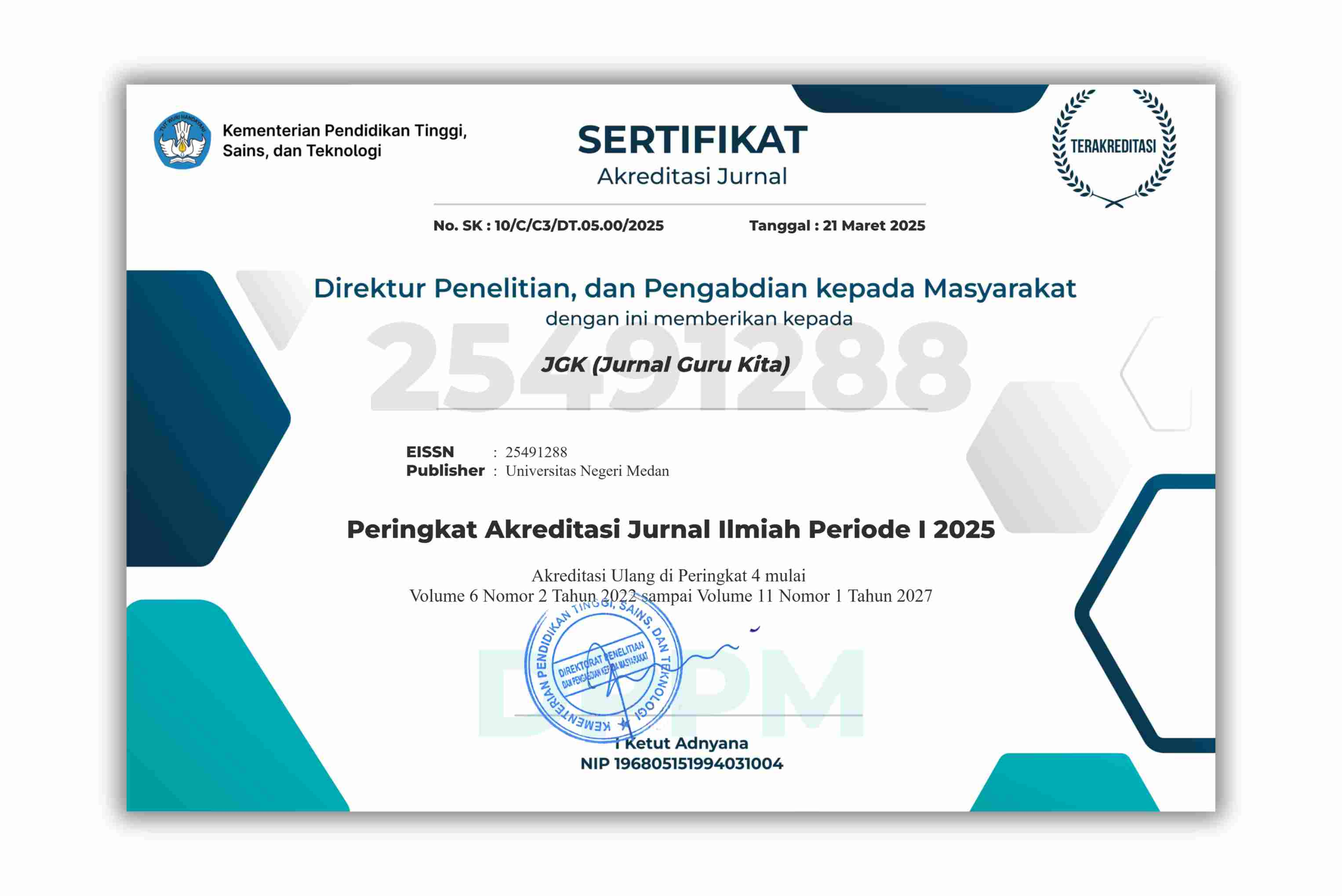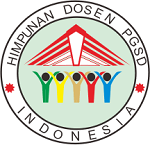PENERAPAN PROJECT BASED LEARNING DALAM UPAYA MENGEMBANGKAN KEMAMPUAN BERPIKIR KREATIF MAHASISWA
DOI:
https://doi.org/10.24114/jgk.v7i1.40458Keywords:
creative thinking skills, project based learningAbstract
This study aims to describe the application of project based learning in an effort to develop creative thinking skills of PGSD FKIP students at Esa Unggul University in the Elementary Mathematics Learning course. Data collection techniques used in the form of: a) the method of observation or observation. b) interview method, interviews were conducted as a way to obtain the information needed by researchers by interviewing several students. c) documentation method, this method is used to obtain data about lecturer learning tools in the form of RPS and PjBL activity steps carried out by students in the form of photos. One of the advantages of the project-based learning model is that it is able to train students in using projects/activities as media. This method requires students to be able to explore, assess, interpret, synthesize, and provide information to produce various forms of learning outcomes. With the application of project based learning, creative thinking skills can develop, because the creative thinking skills observed in this study are the ability to identify, analyze, solve problems, think logically and make decisions correctly and can draw conclusions.References
Amalia, E., Surya, E., & Syahputra, E. (2017). THE EFFECTIVENESS OF USING PROBLEM BASED LEARNING ( PBL ) IN MATHEMATICS PROBLEM SOLVING ABILITY FOR JUNIOR HIGH SCHOOL STUDENTS. 2, 3402“3406.
Argaw, A. S. (2017). The Effect of Problem Based Learning ( PBL ) Instruction on Students ™ Motivation and Problem Solving Skills of Physics. 8223(3), 857“871. https://doi.org/10.12973/eurasia.2017.00647a
Butar-butar, M., Murni, A., & Roza, Y. (2020). Pembelajaran Dengan Penerapan Model Discovery Learning Untuk meningkatkan kemampuan berpikir Kreatif . 04(02), 480“486.
Dale. (2012). Learning Theories an Education Perspective. Pustaka Pelajar.
Duvivier, R., Bate, E., Hommes, J., Duvivier, R., Taylor, D. C. M., Bate, E., Hommes, J., Duvivier, R., & Taylor, D. C. M. (2016). Problem based learning PBL Getting the most out of your students Their roles and responsibilities AMEE Guide No ... responsibilities : AMEE Guide No . 84.
Dwi, I. N., & Anitah, S. W. (2018). The Implementatyion Off Problem Based Learning Model (PBL) on Teachers and Students Grade Five Elementary Schools in Surakarta City. International Journal of Active Learning, 3(2), 116“123. http://journal.unnes.ac.id/nju/index.php/ijal
Han, S. Y., Capraro, R. M., & Capraro, M. M. (2014). HOW SCIENCE , TECHNOLOGY , ENGINEERING , AND MATHEMATICS ( STEM ) PROJECT-BASED LEARNING ( PBL ) AFFECTS HIGH , MIDDLE , AND LOW ACHIEVERS DIFFERENTLY : THE IMPACT OF STUDENT FACTORS ON ACHI ... DIFFERENTLY : THE IMPACT OF STUDENT FACTORS. March. https://doi.org/10.1007/s10763-014-9526-0
Hartati, I. N. dan S. (2019). Metodologi Penelitian Sosial (Lutfiah (ed.)).
Herzon, H. H., Budijanto, B., & Utomo, D. H. (2018). Pengaruh Problem-Based Learning (PBL) terhadap Keterampilan Berpikir Kritis. Jurnal Pendidikan: Teori, Penelitian, Dan Pengembangan, 3(1), 42“46. http://journal.um.ac.id/index.php/jptpp/article/view/10446
Jess, F., Gregory, J. F. (2011). Theories of Personality. McGraw Hill.
Laforce, M., & Noble, E. (2017). education sciences Problem-Based Learning ( PBL ) and Student Interest in STEM Careers : The Roles of Motivation and Ability Beliefs. https://doi.org/10.3390/educsci7040092
Lubis, S. D., & Rangkuti, R. K. (2020). Upaya Meningkatkan Kemampuan Berpikir Kreatif dan Kemampuan Pemecahan Masalah Matematis Siswa dengan Menggunakan Model Pembelajaran Project Based Learning di Kelas VIII SMP Negeri 32 Medan. 01(01), 75“86.
Manurung, A. S., Halim, A., & Rosyid, A. (2020). Pengaruh Kemampuan Berpikir Kreatif untuk meningkatkan Hasil Belajar Matematika di Sekolah Dasar. Jurnal Basicedu, 4(4), 1274“1290. https://doi.org/10.31004/basicedu.v4i4.544
Meriani, N. K., Darsana, W., Rinda Suardika, W., Pendidikan Guru, J., & Dasar, S. (2014). Pengaruh Model Brain Based Learning Berbantuan Media Grafis Terhadap Hasil Belajar Ips Siswa Kelas V Sd Negeri Gugus Letda Kajeng. Jurnal Mimbar PGSD Universitas Pendidikan Ganesha Jurusan PGSD, 2(1).
Rahmawati, A. D., Supriyanto, D. H., & Sari, W. R. (2021). Project-Based Learning Model with A Scientific Approach to Mathematics Learning in Covid-19 Pandemic. 13(1).
Rohim, D. C. (2021). Konsep Asesmen Kompetensi Minimum Meningkatkan Kemampuan Literasi Numerasi Sekolah Dasar untuk Siswa. 54“62. https://doi.org/10.23917/varidika.v33i1.14993
Sugiyono. (2015). Statistika untuk penelitian. Alfabeta.
Sutanto, W., Marjono, & Ramli, M. (2018). Penggunaan Problem Based Learning untuk Meningkatkan Kemampuan Berpikir Kreatif dalam Pembelajaran Biologi Peserta Didik Kelas VII F di Salah Satu SMP Negeri di Surakarta. 11, 61“65.
Wanelly, W., & Fauzan, A. (2020). Pengaruh Pendekatan Open Ended dan Gaya Belajar Siswa terhadap Kemampuan Berpikir Kreatif Matematis. Basicedu, 4(3), 523“533. https://doi.org/10.31004/basicedu.v4i3.388
Wulandari, I. G. A. A. M., Sudatha, I. G. W., & Simamora, A. H. (2020). Pengembangan Pembelajaran Blended Pada Mata Kuliah Ahara Yoga Semester II di IHDN Denpasar. Jurnal Edutech Undiksha, 8(1), 1. https://doi.org/10.23887/jeu.v8i1.26459
Downloads
Published
How to Cite
Issue
Section
License
Authors published with the JGK (Jurnal Guru Kita) agree to the following terms:
- Authors retain copyright and grant the journal the right of first publication with the work simultaneously licensed under a Creative Commons Attribution License (CC BY-SA 4.0) that allows others to share the work with an acknowledgment of the work's authorship and initial publication in this journal.
- Authors are able to enter into separate, additional contractual arrangements for the non-exclusive distribution of the journal's published version of the work (e.g., post it to an institutional repository or publish it in a book), with an acknowledgment of its initial publication in this journal.
- Authors are permitted and encouraged to post their work online (e.g., in institutional repositories or on their website) prior to and during the submission process, as it can lead to productive exchanges, as well as earlier and greater citation of published work. (See The Effect of Open Access)

























